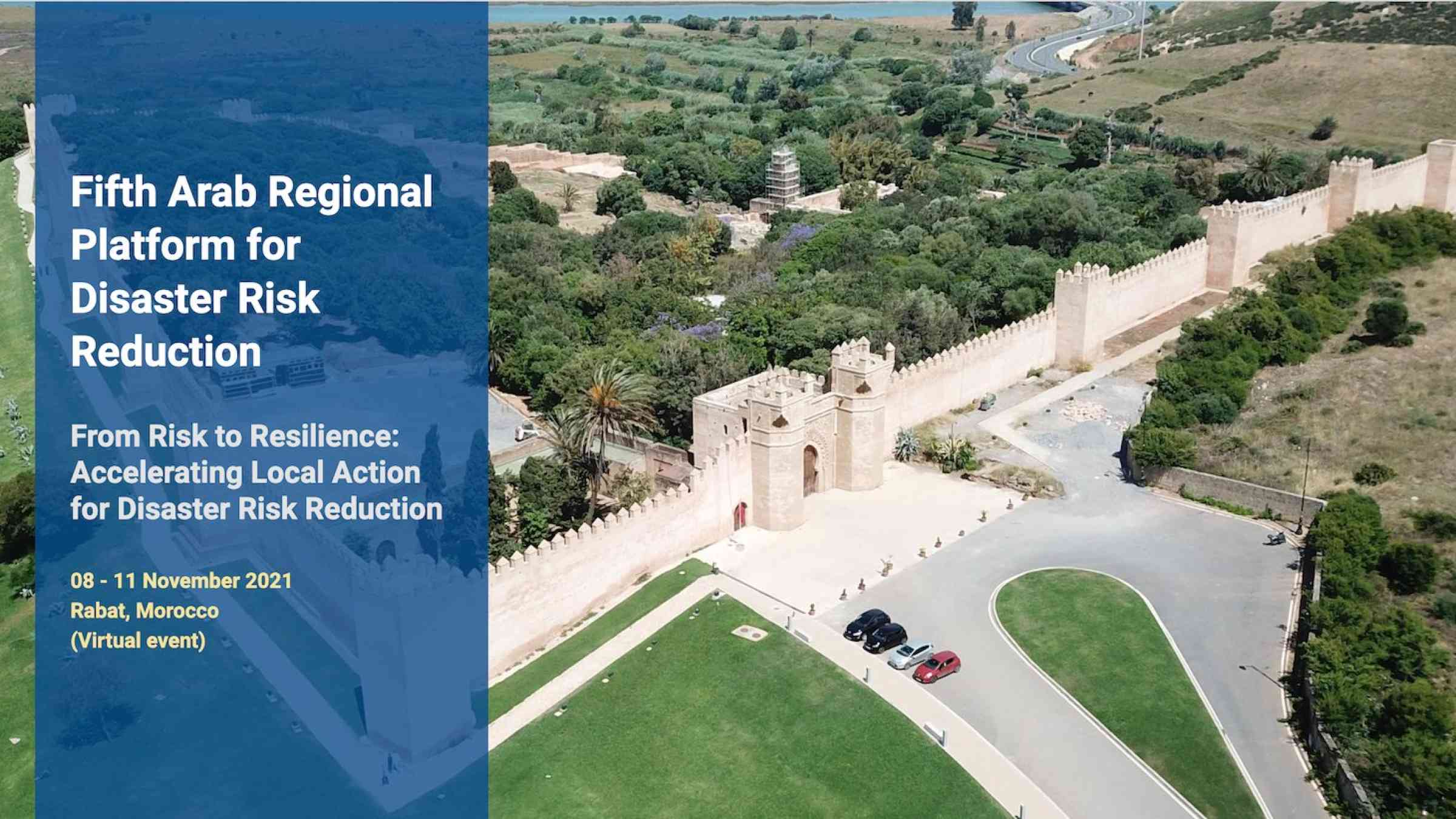The Rabat Declaration for Disaster Risk Reduction: A milestone embodying the political commitment of governments to advancing the work of Disaster Risk Reduction in the Arab region

The ministers and heads of delegations of the Arab Member States of the United Nations and representatives of regional, inter-governmental, and non-governmental organizations participating in the Fifth Arab Regional Platform for Disaster Risk Reduction in Rabat, the Kingdom of Morocco, announced the adoption of Rabat Declaration for Disaster Risk Reduction, calling upon all Arab governments, partners, and stakeholders to integrate and align disaster risk reduction strategies and programmes with sustainable development policies at all relevant social, developmental, and health levels.
The Fifth Arab Regional Platform for Disaster Risk Reduction, a ministerial-level conference, was organized by the United Nations Office for Disaster Risk Reduction, Regional Office for Arab States (UNDRR ROAS), the Kingdom of Morocco, and the League of Arab States from 8 to 11 November under the theme “From Risk to Resilience: Accelerating Local Action for Disaster Risk Reduction.” The platform was organized virtually and hosted by the Kingdom of Morocco.
Mohammed Faouzi, Secretary-General Ministry of Interior, Kingdom of Morocco, Chair of the Platform, read the details of the Declaration, announcing that the ministers, heads of delegations, and representatives pledged to work together to enhance the implementation of the recommendations of the Declaration through the Arab Coordination Mechanism for Disaster Risk Reduction and in cooperation with the UNDRR ROAS. They reiterated the goals, priorities, and targets of the Sendai Framework and the Arab Strategy for Disaster Risk Reduction 2030 and renewed their commitment and support to lead a paradigm shift from disaster risk management to more comprehensive and risk-resilient development practice.
“The Rabat Declaration embodies the political commitment of governments to advancing the work of disaster risk reduction,” said Mami Mizutori, Special Representative of the Secretary-General for Disaster Risk Reduction and Head of UNDRR, in her closing remarks. “We expect it will be put into action to prevent and reduce risk in the region, to accelerate the implementation of the Sendai Framework and the Arab Strategy for Disaster Risk Reduction 2030, to serve as a reference for monitoring progress, to increase regional cooperation, and to boost government investments in disaster risk reduction.”
Dr. Kamal Hassan Ali, Assistant Secretary-General for Economic Affairs, League of Arab States, said, “this declaration is a roadmap for raising awareness, building capacity, and working with international mechanisms in relation to disaster risk reduction, as well as a tool for strengthening national strategies.”
For four days and throughout 25 sessions, 16 countries and more than 100 experts and 500 participants – representing the Arab States countries, UN organizations, Arab and intergovernmental organizations, non-governmental organizations, academia, women, youth, civil society, partners, stakeholder groups, and media – gathered in a ministerial level, multi-stakeholder, inclusive, innovative, and interactive platform.
They expressed their full awareness of the increasing frequency of hazards and the resulting scale of human and economic losses. The Arab States face multiple challenges due to disasters triggered by natural and biological hazards such as earthquakes, floods, landslides, storms, droughts, epidemics, fires, including forest fires, agricultural crops, and other man-made disasters that directly affect the environment, populations, human movements, and infrastructure.
The Fifth Arab Regional Platform witnessed the launching of the first Regional Assessment Report on Disaster Risk Reduction in the Arab Region (RAR-Arab States). The report is a go-to guide for governments, policy experts, disaster risk reduction practitioners, and all stakeholders in the Arab region.
RAR-Arab States is influenced by the Global Assessment Report on Disaster Risk Reduction 2019 (GAR19), and offers an update on progress made in implementing the Sendai Framework’s goal, targets, and priorities while identifying entry points for improving coherence with climate change adaptation and sustainable development. It also provides an analysis of region-specific systemic risk drivers, including a contextualized discussion on vulnerability, rapid urbanization, conflict, and food security.
The Regional Platform resulted as well in determining a set of renewed voluntary action statements on implementing the Sendai Framework and the Arab Strategy for Disaster Risk Reduction 2030 and a prioritized Plan of Action (2021-2024) for the Arab Strategy for Disaster Risk Reduction 2030 offering a clear direction for the short term.
The discussions and outcomes of the Fifth Arab Regional Platform will inform the Mid-Term Review of the Sendai Framework and feed into the sessions of the Global Platform for Disaster Risk Reduction which will take place next May in Indonesia.